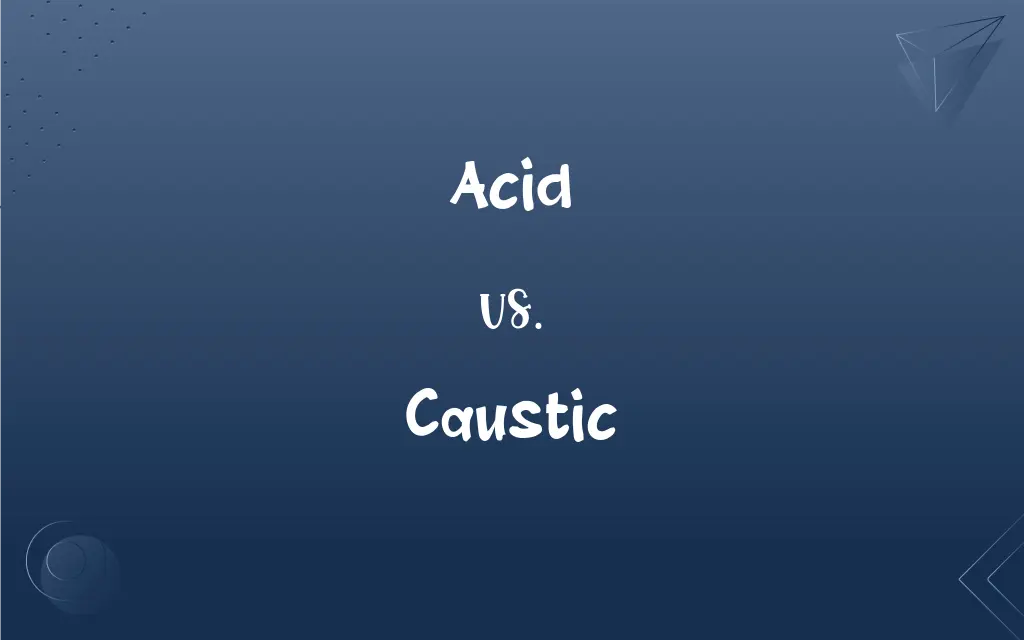Acid vs. Caustic: What's the Difference?
Edited by Harlon Moss || By Janet White || Updated on October 3, 2023
Acid is a substance that donates protons or accepts electrons, often having a sour taste and corroding metals, while caustic refers to a substance that can burn or corrode organic tissue by chemical action.

Key Differences
Acid and caustic refer to different types of chemical substances that can be hazardous and corrosive. Acid denotes a broad class of molecules or ions capable of donating protons or accepting electrons during a reaction. Acids generally taste sour and can corrode metals. In a chemical context, acids are known to turn blue litmus paper red due to their ability to donate hydrogen ions. They react with bases to form salts and water, a neutralization reaction. Acids are diverse, and they can be strong or weak, denoting their ability to ionize in a solution.
In contrast, caustic pertains to substances that are capable of burning, corroding, or destroying organic tissue through chemical reactions. It often refers to strong bases that are alkaline in nature and are characterized by their ability to react with acids and form salts. Caustic substances can cause severe burns on contact with body tissues. The term is commonly associated with substances like caustic soda (sodium hydroxide) and caustic potash (potassium hydroxide), which are highly alkaline and can cause tissue damage on contact.
The differentiation between acid and caustic is inherently tied to their chemical properties and behaviors. Acids release protons in solution and are proton donors, whereas caustic substances, being highly alkaline, can accept protons, acting as proton acceptors. The corrosive nature of both acids and caustic substances can cause harm, but they do so through different chemical mechanisms, and they lie at opposite ends of the pH scale.
Acids and caustic substances are integral in various industrial processes, medical applications, and research due to their reactive properties. However, the handling of such substances necessitates caution and protective measures due to their corrosive and potentially harmful nature. Appropriate safety protocols are essential when dealing with both acids and caustic substances to prevent injury and damage.
While acids have extensive classifications and properties ranging from strong to weak, caustic generally refers to substances that are strongly basic and reactive. The interaction between acids and caustic substances can lead to neutralization reactions, yielding salts and water. Despite their differing properties, both acids and caustic substances are crucial in chemistry, each serving specific roles and functions in various applications.
ADVERTISEMENT
Comparison Chart
Nature
Chemical substance that can donate protons or accept electrons.
Substance capable of corroding or burning organic tissue.
PH
Less than 7.
Greater than 7.
Common Examples
Hydrochloric acid, Sulfuric acid.
Caustic soda, Caustic potash.
Reaction with Metals
Corrodes metals, producing hydrogen gas.
Reacts with metals to form hydrogen gas.
Reaction with Bases
Reacts to form water and salt.
Reacts with acids to form water and salt.
ADVERTISEMENT
Acid and Caustic Definitions
Acid
A substance that can donate protons or accept electrons during a chemical reaction.
Sulfuric acid is used in the production of fertilizers.
Caustic
Being at a high degree of alkalinity.
Caustic potash is a potent base used in various chemical processes.
Acid
Any substance that in water solution tastes sour, changes the color of certain indicators, promotes certain chemical reactions, etc.
Citric acid gives lemons their sour taste.
Caustic
Severely critical or sarcastic.
His caustic remarks left everyone in the room speechless.
Acid
A substance that has a pH level below 7.
Vinegar is acidic due to the presence of acetic acid.
Caustic
Capable of burning, corroding, or destroying living tissue.
The caustic solution burned through the lab technician's glove.
Acid
A molecule or ion capable of donating a hydron or forming a covalent bond with an electron pair.
Hydrochloric acid is a strong acid that fully dissociates in water.
Caustic
Referring to a substance, especially a strong alkali, that is capable of burning or corroding organic tissue.
Caustic soda is used in soap-making.
Acid
A substance that corrodes metals, changes litmus paper red, and becomes less acidic when mixed with bases.
The battery acid leaked, causing corrosion on the metal contacts.
Caustic
A substance or remark having a burning or stinging effect.
The worker accidentally spilled a caustic chemical on his hand.
Acid
Any of a class of substances whose aqueous solutions are characterized by a sour taste, the ability to turn blue litmus red, and the ability to react with bases and certain metals to form salts.
Caustic
Capable of burning, corroding, dissolving, or eating away by chemical action.
Acid
A substance that yields hydrogen ions when dissolved in water.
Caustic
Sarcastic or cutting; biting
“The caustic jokes ... deal with such diverse matters as political assassination, talk-show hosts, medical ethics” (Frank Rich).
Acid
A substance that can act as a proton donor.
Caustic
Given to making caustic remarks
A caustic TV commentator.
Acid
A substance that can accept a pair of electrons to form a covalent bond.
Caustic
A caustic material or substance.
Acid
A substance having a sour taste.
Caustic
A hydroxide of a light metal.
Acid
The quality of being sarcastic, bitter, or scornful
Wrote with acid about her first marriage.
Caustic
The enveloping pattern formed by light rays reflecting or refracting from a curved surface.
Acid
(Slang) See LSD1.
Caustic
Capable of burning, corroding or destroying organic tissue.
Acid
Of, relating to, or containing an acid.
Caustic
(of language, etc.) Sharp, bitter, cutting, biting, and sarcastic in a scathing way.
Acid
Having a high concentration of acid.
Caustic
Any substance or means which, applied to animal or other organic tissue, burns, corrodes, or destroys it by chemical action; an escharotic.
Acid
Having the characteristics of an acid.
Caustic
The envelope of reflected or refracted rays of light for a given surface or object.
Acid
Having a pH of less than 7.
Caustic
(mathematics) The envelope of reflected or refracted rays for a given curve.
Acid
Having a relatively high concentration of hydrogen ions.
Caustic
Caustic soda.
Acid
(Geology) Containing a large proportion of silica
Acid rocks.
Caustic
Capable of destroying the texture of anything or eating away its substance by chemical action; burning; corrosive; searing.
Acid
Having a sour taste.
Caustic
Severe; satirical; sharp; as, a caustic remark.
Acid
Biting, sarcastic, or scornful
An acid wit.
An acid tone of voice.
Caustic
Any substance or means which, applied to animal or other organic tissue, burns, corrodes, or destroys it by chemical action; an escharotic.
Acid
Sour, sharp, or biting to the taste; tart; having the taste of vinegar.
Acid fruits or liquors
Caustic
A caustic curve or caustic surface.
Acid
(figuratively) Sour-tempered.
Caustic
Any chemical substance that burns or destroys living tissue
Acid
Of or pertaining to an acid; acidic.
Caustic
Harsh or corrosive in tone;
An acerbic tone piercing otherwise flowery prose
A barrage of acid comments
Her acrid remarks make her many enemies
Bitter words
Blistering criticism
Caustic jokes about political assassination, talk-show hosts and medical ethics
A sulfurous denunciation
Acid
(music) Denoting a musical genre that is a distortion (as if hallucinogenic) of an existing genre, as in acid house, acid jazz, acid rock.
Caustic
Of a substance, especially a strong acid; capable of destroying or eating away by chemical action
Acid
A sour substance.
Acid
(chemistry)
Acid
Any compound which yields H+ ions (protons) when dissolved in water; an Arrhenius acid.
Acid
Any compound that easily donates protons to a base; a Brønsted acid.
Acid
Any compound that can accept a pair of electrons to form a covalent bond; a Lewis acid.
Acid
Any corrosive substance.
Acid
LSD, lysergic acid diethylamide.
Acid
Sour, sharp, or biting to the taste; tart; having the taste of vinegar: as, acid fruits or liquors. Also fig.: Sour-tempered.
He was stern and his face as acid as ever.
Acid
Of or pertaining to an acid; as, acid reaction.
Acid
A sour substance.
Acid
One of a class of compounds, generally but not always distinguished by their sour taste, solubility in water, and reddening of vegetable blue or violet colors. They are also characterized by the power of destroying the distinctive properties of alkalies or bases, combining with them to form salts, at the same time losing their own peculiar properties. They all contain hydrogen, united with a more negative element or radical, either alone, or more generally with oxygen, and take their names from this negative element or radical. Those which contain no oxygen are sometimes called hydracids in distinction from the others which are called oxygen acids or oxacids.
Acid
Any of various water-soluble compounds having a sour taste and capable of turning litmus red and reacting with a base to form a salt
Acid
Street name for lysergic acid diethylamide
Acid
Harsh or corrosive in tone;
An acerbic tone piercing otherwise flowery prose
A barrage of acid comments
Her acrid remarks make her many enemies
Bitter words
Blistering criticism
Caustic jokes about political assassination, talk-show hosts and medical ethics
A sulfurous denunciation
Acid
Containing acid;
An acid taste
FAQs
Are all acids harmful?
No, some acids like citric acid are weak and commonly found in foods, and are not harmful in normal consumption.
Are caustic substances always alkaline?
Generally, yes; caustic substances are typically strongly alkaline and can neutralize acids.
Can acids corrode metals?
Yes, many acids can corrode metals, releasing hydrogen gas in the process.
Are all acids sour in taste?
Generally, yes; acids often have a sour taste, but tasting is not a safe method to identify them.
Can acids and caustic substances be neutralized?
Yes, acids can be neutralized by bases, and caustic substances by acids, typically forming water and a salt.
Is the term caustic used only in chemistry?
No, it can also describe severe criticism or sarcasm in language.
Are caustic substances reactive?
Yes, caustic substances are highly reactive, especially with acids, and can cause burns.
Can caustic substances burn skin?
Yes, caustic substances can cause severe burns and damage to the skin and other tissues on contact.
Can acids have a pH above 7?
No, substances with a pH above 7 are considered basic or alkaline, not acidic.
Are caustic substances used in cleaning products?
Yes, many cleaning products contain caustic substances to break down organic materials.
Can acids be strong or weak?
Yes, acids can be classified as strong or weak depending on their ability to ionize in solution.
Can caustic substances be neutral?
No, caustic refers to strongly basic substances that are not neutral.
Can acid neutralization be dangerous?
It can be, depending on the acid and base involved; it may release heat and cause splattering.
Can caustic substances be found in the household?
Yes, substances like drain cleaners can contain caustic chemicals.
Is acid rain harmful?
Yes, acid rain can damage the environment, buildings, and harm aquatic life.
About Author
Written by
Janet WhiteJanet White has been an esteemed writer and blogger for Difference Wiki. Holding a Master's degree in Science and Medical Journalism from the prestigious Boston University, she has consistently demonstrated her expertise and passion for her field. When she's not immersed in her work, Janet relishes her time exercising, delving into a good book, and cherishing moments with friends and family.
Edited by
Harlon MossHarlon is a seasoned quality moderator and accomplished content writer for Difference Wiki. An alumnus of the prestigious University of California, he earned his degree in Computer Science. Leveraging his academic background, Harlon brings a meticulous and informed perspective to his work, ensuring content accuracy and excellence.































































